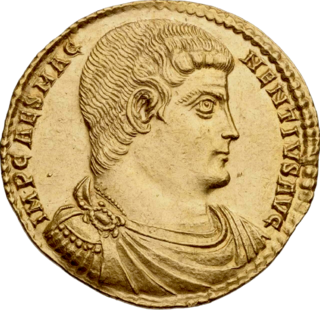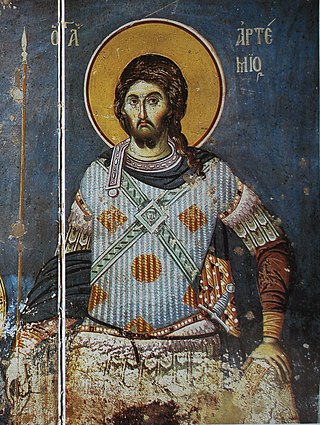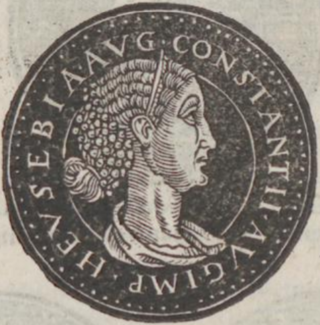Related Research Articles

Constantius II was Roman emperor from 337 to 361. His reign saw constant warfare on the borders against the Sasanian Empire and Germanic peoples, while internally the Roman Empire went through repeated civil wars, court intrigues, and usurpations. His religious policies inflamed domestic conflicts that would continue after his death.

Julian was the Caesar of the West from 355 to 360 and Roman emperor from 361 to 363, as well as a notable philosopher and author in Greek. His rejection of Christianity, and his promotion of Neoplatonic Hellenism in its place, caused him to be remembered as Julian the Apostate in Christian tradition. He is sometimes referred to as Julian the Philosopher.
The 350s decade ran from January 1, 350, to December 31, 359.

Valentinian I, sometimes called Valentinian the Great, was Roman emperor from 364 to 375. He ruled the Western half of the empire, while his brother Valens ruled the East. During his reign, he fought successfully against the Alamanni, Quadi, and Sarmatians, strengthening the border fortifications and conducting campaigns across the Rhine and Danube. His general Theodosius defeated a revolt in Africa and the Great Conspiracy, a coordinated assault on Roman Britain by Picts, Scoti, and Saxons. Valentinian founded the Valentinianic dynasty, with his sons Gratian and Valentinian II succeeding him in the western half of the empire.

Jovian was Roman emperor from June 363 to February 364. As part of the imperial bodyguard, he accompanied Emperor Julian on his campaign against the Sasanian Empire. Julian was killed in battle, and the exhausted and ill-provisioned army declared Jovian his successor. Unable to cross the Tigris, Jovian extricated his troops from enemy territory by making peace with the Sasanids on humiliating terms. He spent the rest of his eight-month reign traveling back to Constantinople. After his arrival at Edessa, Jovian was petitioned by bishops over doctrinal issues concerning Christianity. He died at Dadastana, never having reached the capital.

Magnus Magnentius was a Roman general and usurper against Constantius II from 350 to 353. Of Germanic descent, Magnentius served with distinction in Gaul under the Western emperor Constans. On 18 January 350 Magnentius was acclaimed Augustus. Quickly killing the unpopular Constans, Magnentius gained control over most of the Western Empire. The Eastern emperor Constantius II, the brother of Constans, refused to acknowledge Magnentius' legitimacy and led a successful campaign against Magnentius in the Roman civil war of 350–353. Ultimately, Magnentius' forces were scattered after the Battle of Mons Seleucus, and he committed suicide on 11 August 353.

Flavius Claudius Constantius Gallus (326–354) was a statesman and ruler in the eastern provinces of the Roman Empire from 351 to 354, as Caesar under emperor Constantius II, his cousin. A grandson of emperor Constantius Chlorus and empress Flavia Maximiana Theodora, and a son of Julius Constantius and Galla, he belonged to the Constantinian dynasty. Born during the reign of his uncle Constantine the Great, he was among the few male members of the imperial family to survive the purge that followed Constantine's death. Under Constantius II, Gallus served as deputy emperor, based in Antioch and married to Constantius' sister Constantina. He dealt with a Jewish revolt in the years 351-352. Gallus ultimately fell out of favor with Constantius and was executed, being replaced as Caesar by his younger half-brother Julian.
Salamanes Hermias Sozomenos, also known as Sozomen, was a Roman lawyer and historian of the Christian Church.
Paulus Catena was a senior Roman public official who served as an investigator and notary for Constantius II during the mid-fourth century. He is principally known through the writings of Ammianus Marcellinus, though he is also present in the works of Libanius and Julian the Apostate. Marcellinus describes him as infamously cruel, and a skilled fabricator of false accusations.
(Flavius) Julius Constantius was a politician of the Roman Empire and a member of the Constantinian dynasty, being a son of Emperor Constantius Chlorus and his second wife Flavia Maximiana Theodora, a younger half-brother of Emperor Constantine the Great and the father of Emperor Julian.

Artemius, also known as Shallita, spelt Shalita or Chalita was a Syrian general of the Roman Empire and dux Aegypti or imperial prefect of Roman Egypt. He is considered a saint by the Catholic and the Orthodox Churches, by the name of Artemius of Antioch, Mar Shalita of Antioch, and Mar Shalita the Martyr.
Domnica was the wife of Roman emperor Valens. Valens, who ruled from 364 to 378, was emperor of the East and co-emperor with his brother Valentinian I. After the death of her husband in 378 she ruled as de facto regent and defended Constantinople against the attacking Goths until his successor, Theodosius I arrived.

The Jewish revolt against Constantius Gallus erupted during the Roman civil war of 350–353, upon destabilization across the Roman Empire. In 351–352 the Jews of Roman Palaestina revolted against the rule of Constantius Gallus, brother-in-law of Emperor Constantius II and Caesar of the eastern part of the Roman Empire. The revolt was crushed by Gallus' general Ursicinus.
The Arian controversy was a series of Christian disputes about the nature of Christ that began with a dispute between Arius and Athanasius of Alexandria, two Christian theologians from Alexandria, Egypt. The most important of these controversies concerned the relationship between the substance of God the Father and the substance of His Son.

Eusebia was the second wife of Roman emperor Constantius II. The main sources for the knowledge about her life are Julian's panegyric "Speech of Thanks to the Empress Eusebia", as well as several remarks by the historian Ammianus Marcellinus.

Helena was a Roman Empress by marriage to Julian, Roman emperor in 360–363. She was briefly his Empress consort when Julian was proclaimed Augustus by his troops in 360. She died prior to the resolution of his conflict with Constantius II.

This article chronicles the attested movements of the fourth-century Roman emperors Constantine II, Constantius II, Constans, Gallus, and Julian the Apostate from 337 to 361 AD. It does not cover the imperial usurpers of the period, including Magnentius, Vetranio, Claudius Silvanus, and Poemenius. The chronology is principally derived from Timothy Barnes' Athanasius and Constantius. Substantial additions and further sources are based on recent research that seeks to go beyond Barnes' own chronology and slightly modifying his at a few places.
Patrophilus was the Arian bishop of Scythopolis in the early-mid 4th century AD. He was an enemy of Athanasius who described him as a πνευματόμαχος or "fighter against the Holy Spirit". When Arius was exiled to Palestine in 323 AD, Patrophilus warmly welcomed him.

Julian's Persian expedition began in March 363 AD and was the final military campaign of the Roman emperor Julian. The Romans fought against the Sasanian Empire, ruled at the time by Shapur II.
Cecropius of Nicomedia was a bishop of Nicomedia and a key player in the Arian controversy.
References
- ↑ Socrates, ii.2.5-6; Sozomen, iii.1.4.
- ↑ Photius, 256.
- ↑ Socrates, ii.2.5-6; Sozomen, iii.1.4, iv.16.22; Zonaras, xiii.11.
- ↑ Libanius, Orationes, xviii.152, lxii.9; Sozomen, iii.1.4; Socrates, ii.2.5-6; Zonaras, xiii.9; Ammianus Marcellinus, xviii.4.3.
- ↑ Athanasius, 35; Theodoret, ii.16.9.15.
- ↑ Theodoret, ii.16.28; Palladius, 63.
- ↑ Ammianus Marcellinus, xiv.10.5, 11.2, 11.21; Zonaras, xiii.9; Julian, 272D; Libanius, Orationes, xviii.152.
- ↑ Ammianus Marcellinus, xv.3.2, xvi.8.13, xviii.4.3.
- ↑ Ammianus Marcellinus, xxi.15.4; xxii.3.12; Zonaras, xiii.12; Philostorgius, iv.1; Artemii Passio, 21; Socrates, iii.1.46,49; Sozomen, v.5 8.